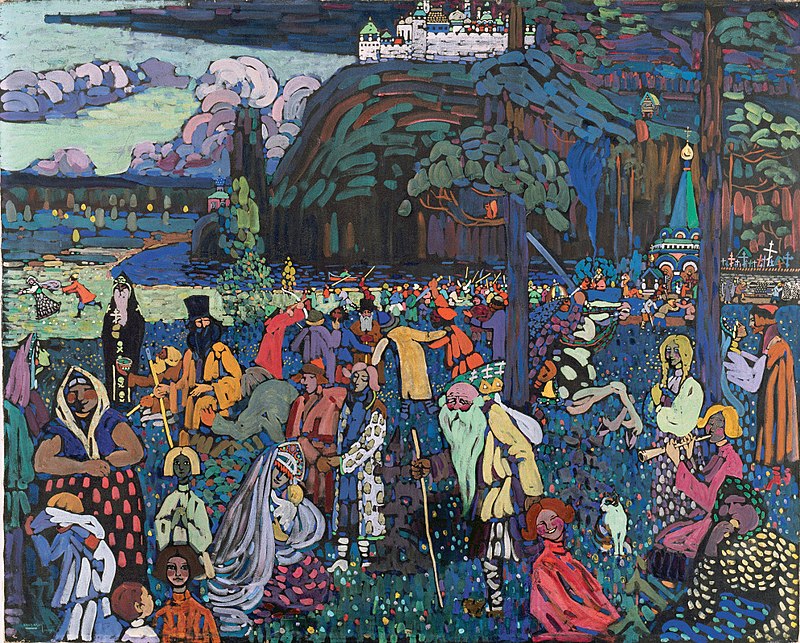German Advisory Commission Classifies a Kandinsky Painting as Nazi Looted Art

The Advisory Commission on the return of cultural property seized as a result of Nazi persecution, especially Jewish property, chaired by Prof. Hans-Jürgen Papier, decided on 16 May 2023 in the case of the heirs of Hedwig Lewenstein Weyermann and Irma Lewenstein Klein versus Bayerische Landesbank, to recommend the restitution of the painting Das bunte Leben [The Colorful Life] (1907) by Wassily Kandinsky to the heirs of Hedwig Lewenstein Weyermann and Irma Lewenstein Klein.
From November 1927, the painting belonged to Hedwig and Emanuel Albert Lewenstein, a couple living in Amsterdam. It was part of their extensive art collection. The painting was auctioned on 9 October 1940 – just a few months after the occupation of the Netherlands by the German Wehrmacht – at the auction house Frederik Muller & Co in Amsterdam as one of 82 lot numbers of the Lewenstein estate.
Up until a few weeks before the auction, Das bunte Leben was on loan from the Lewenstein family to the Stedelijk Museum in Amsterdam. It was collected from there on 5 September 1940 on behalf of the art dealer Abraham Mozes Querido. Despite years of research, it has not been possible to clarify who ordered the painting to be picked up from the museum. For this reason, there is no proof of who instigated the sale of the painting at auction by Frederik Muller & Co as part of the Lewenstein estate. At the auction on 9 October 1940 Das bunte Leben was acquired by Salomon B. Slijper, whose widow sold it to the Bayerische Landesbank for 900,000 Dutch guilders (892,524.90 Deutschmarks) in 1972. Since then the painting has been on loan to the Städtische Galerie im Lenbachhaus and the Kunstbau in Munich.
At the time Das bunte Leben was auctioned in October 1940, the children of the deceased Hedwig and Emanuel Albert Lewenstein, Robert Gotschalk Lewenstein and Wilhelmine Helene Lewenstein, had already emigrated to the USA and to the Portuguese colony of Mozambique respectively. Only Irma had remained in Amsterdam: she was Robert’s separated wife. She survived the war, but was repeatedly the victim of severe persecution.
In the proceedings before the Advisory Commission on the return of cultural property seized as a result of Nazi persecution, especially Jewish property, the Bayerische Landesbank took the view that Irma Lewenstein Klein had put up the collection for auction – including Das bunte Leben – in connection with her divorce settlement. The claimants were of the opinion that the auction of the Lewenstein collection took place in connection with the occupation by the National Socialists and the systematic persecution of the Jewish population that this involved.
The Advisory Commission is of the opinion that the painting was seized as a result of persecution. The Lewenstein family and Irma Lewenstein Klein were persecuted as Jews by the National Socialists from the beginning of the German occupation of the Netherlands on 10 May 1940. According to the statutory presumption set down in the German Guidelines for implementing the Statement by the Federal Government, the Länder and the national associations of local authorities on the tracing and return of Nazi-confiscated art, especially Jewish property, of December 1999 (New edition 2019) (hereinafter: Guidelines), a sale is deemed to be a seizure as a result of persecution if the persons concerned are considered to have been persecuted. There is no evidence to support the assumption that Irma Lewenstein Klein arranged for the painting to be handed over of her own free will. As such, it is not possible to refute the statutory presumption.
The Advisory Commission emphasises that the systematic exclusion, disenfranchisement and dispossession of the Jewish population of the Netherlands began immediately after the invasion of the German Wehrmacht on 10 May 1940. Due to the immediate disenfranchisement of Jewish citizens, the Advisory Commission is therefore of the opinion that the statuary presumption set down in the Guidelines should be applied from the time the invasion began. The Dutch restitution rules, the recently reformed assessment framework, likewise contain a provision to this effect. “If the original owner was a private individual belonging to a persecuted group, involuntary expropriation is presumed if it occurred in the Netherlands after 10 May 1940, in Germany after 30 January 1933 or in Austria after 13 March 1938, unless expressly stated otherwise.”
For this reason, the Advisory Commission recommends the restitution of the painting Das bunte Leben to the heirs of Hedwig Lewenstein Weyermann and Irma Lewenstein Klein.
